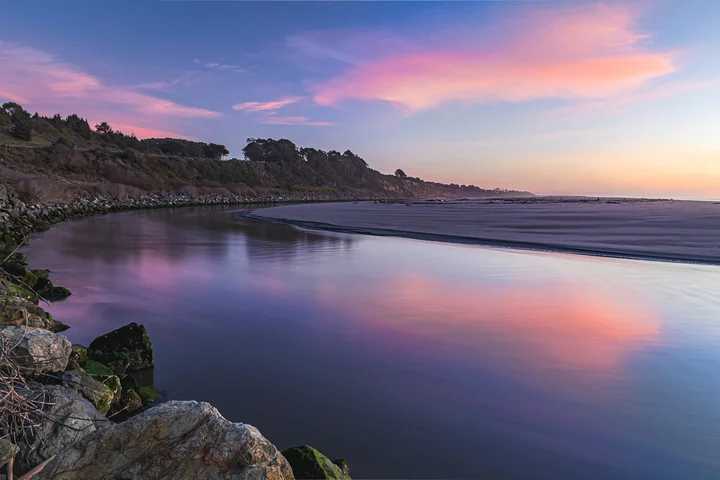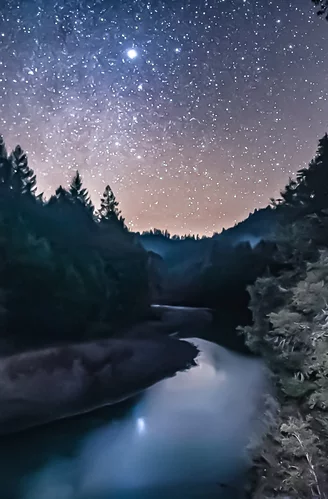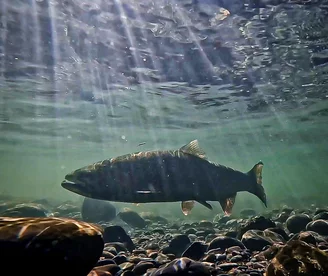The Mad River/Baduwa’t at sunset. By Dave Feral.
It’s December 1849, and explorer and naturalist Josiah Gregg is alone. He is furious. He is hungry. His buddies absconded to get a meal at a nearby Wiyot village, leaving him stranded at a river they were resting at while he drew up a map of the area they explored. He crossed the river and found his crew.
“His cup of wrath was now filled to the brim,” a later recount of the expedition would put it, “but he remained silent until the opposite shore was gained, when he opened upon us a perfect batter of the most withering and violent abuse.”
After a minute everyone relaxed, but the incident remained fresh in Gregg’s mind. He christened the river he crossed in pursuit of bread and revenge the “Mad River” on his map. The U.S. government bought the map, and over the following decade, settlers colonized the area Gregg charted. 175 years after Josiah Gregg had a fit on the banks of a river nameless to him and his party, people still call it the Mad.
But there were people living near that river thousands of years before Gregg’s tantrum, and they called it a different name: Baduwa’t, “free-flowing river.” Almost two centuries after the river was given the Mad moniker, people are trying to change it back.
Dave Feral talks slowly, but he makes up for it by way of persistence. Every answer to every question ricochets around the point for a while before hitting a glancing blow.
Feral is the founder and executive director of the Baduwa’t Watershed Council (BWC), an organization dedicated to preserving the health of the river. He’s also a driving force behind the recently released Baduwa’t, a documentary about the river’s health, its turbulent history with outsiders and the Wiyot effort to both formally and colloquially change the name.
“I’m way too verbose, so you gotta cut me down,” Feral said in an interview with the Outpost. “There’s piles of my stuff on the floor.”
Mostly composed of gorgeous river b-roll and interviews with everyone from Wiyot tribal members and scientists to county supervisor Steve Madrone to Feral himself, the work on the film started in 2021 and wrapped last year. It had a private premiere at the Arcata Theatre Lounge last month. Feral and the film’s co-director, Michelle Hernandez, a member of the Wiyot Tribe, hope to secure a public release in February at the Eureka Theater.
It’s a trim film that touches on a lot in its 41-minute runtime. Feral and Hernandez both summed it up as a story about the river as a whole and the people that use it.
“It’s about hope and changing a name,” Hernandez said. “It’s also about how we got to where we are currently with the river’s health. Basically, ‘What can a community do before it’s too late, before it gets sick?’”
The BWC hopes they can convince their audience of the importance of changing the name of the river back to Baduwa’t. Hernandez and Feral argue that beginning a public discussion about changing the name will draw more eyes to the ecological health of the river.
“I thought for many years about the Baduwa’t before this transpired into the story it is now,” Feral said. “At a certain point, I went ‘You know what? If we begin to share the story of Baduwa’t, more people will become aware of the river…’ I think that’s the impetus, to say ‘What would it be like if we just started the process of getting people to recognize the name Baduwa’t instead of Mad?’”
This renaming effort is part of a larger narrative, in Humboldt and around the U.S. and worldwide, of indigenous-led efforts to rename places in the original native tongue. In Humboldt, Patrick’s Point State Park became Sue-Meg in 2021. There’s even a program the Wiyot tribe runs to find Soulatluk place names for agencies that want one.
Feral says there has been a backlash about the proposed shift to Baduwa’t, a kind of entrenched nostalgia from people whose ancestors lived in Humboldt for a while and always called it the Mad and see no reason to change it back.
“There have been a couple people on projects I’ve worked on … they’re complaining on public forums on Facebook,” Feral said. “I’m like, ‘Hey, you know what? To be accurate, this name existed way before anyone you’re related to got here and pushed some other people off of their land.’”
Feral knows firsthand that the process of changing names isn’t simple. Several years ago, he changed the name of the BWC from its previous name, the Mad River Alliance. Board members questioned the move. State grant checks made out to Mad River Alliance had to be fixed. People still complain about the adjustment.
Hernandez and Feral also believe that the original renaming of the river was symbolic of greater injustices, both to the Wiyot people and the ecosystem as a whole. Reclaiming Baduwa’t would be beneficial for both the community at large and the river itself.
“The renaming of Baduwa’t to ‘Mad River’ marked the beginning of a series of destructive events, including the gold, timber, and green rushes, that have severely impacted the watershed,” the BWC website reads.
“The Wiyot never changed the name,” Feral said. “They never gave up sovereignty of their land, their tribe, or any of the names they used before colonization occurred. I think that opening up the dialog and helping us understand how we see things from a colonial perspective versus [how] the Wiyot tribes or indigenous people see things is very important, because it begins the healing process that’s not just looking at the landscape and the damage that was occurred when the gold rush, the timber rush, and the fish rush occurred, and all the other atrocities that occurred with the capitalist colonization 175 years ago, but also recognizing how things had been managed before.”
Feral thinks Baduwa’t is an essentially hopeful film, and he claims many people that have seen it agree with him — but it can be hard to be optimistic during this film, when much of it focuses on how poorly the river is doing. The steelhead salmon population of the river is the smallest it’s ever been. Illegal water diversions for illicit cannabis grows are making it hotter. Clearcuts and logging roads dump tons of debris into the river. But Feral and Hernandez believe that a re-branding of the river back to Baduwa’t could help ameliorate those conditions by drawing more public attention to its problems.
“I’m hoping when I go home [to Humboldt] I hear more people referring to it as Baduwa’t and not the Mad River,” Hernandez said. “I hope [the film] helps cause a movement not just here, but throughout the United States. We’re seeing what happened, and we’re hoping that other people decide to reclaim other names that have been changed throughout the U.S. I hope this causes a movement so that we have more say in how we take care of this land, so we can prevent climate change from causing more damage than it’s already causing.”



CLICK TO MANAGE